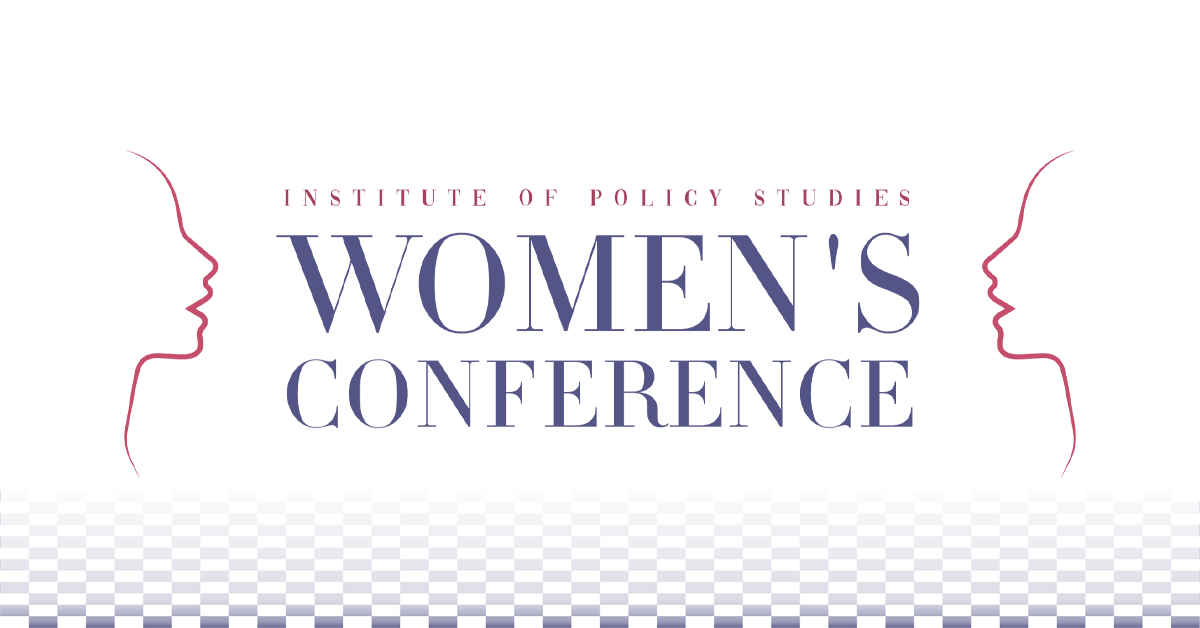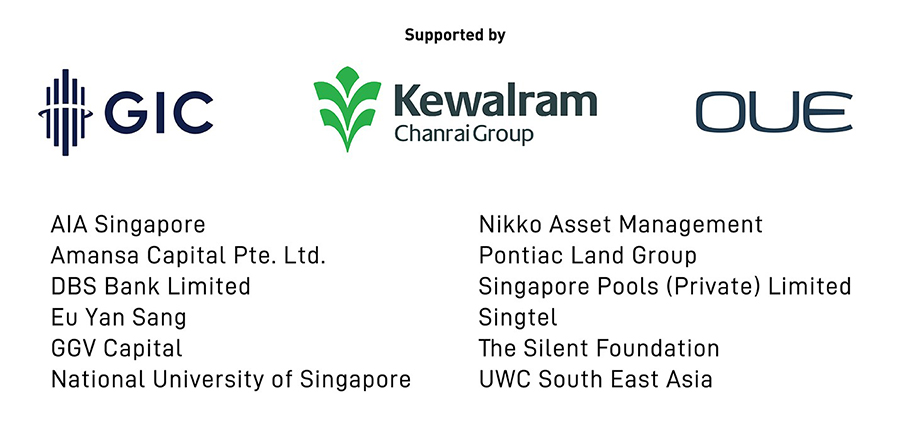
On 3 June 2021, the Institute of Policy Studies held its Women’s Conference, titled “Gender Equality in Singapore: An Action Plan for Progress”. The conference brought together thought leaders, academics, activists and community leaders to address the challenges Singaporean women face in a rapidly changing world.
Attended by over 800 participants, the one-day virtual conference came amid a national review of women’s issues by the government that will culminate in a White Paper to be tabled in Parliament. Featuring an opening address, three moderated panel discussions and a closing dialogue, the forum saw robust discussions and new insights on persistent issues of gender disparity, along with policy recommendations on how to build a more gender-inclusive society
In her opening address, President Halimah Yacob called for a whole-of-society approach to support and advance gender equality efforts, including a review of existing laws and social norms. To help women balance the disproportionate demands of domestic caregiving responsibilities, she urged fathers to be more involved in family caregiving and employers to be more understanding by creating family-friendly workplaces.
The President also said that Singaporeans must send a strong signal condemning sexual harassment and violence against women, stressing “zero tolerance for the degradation of girls and women in our society”. Young men have to be taught from an early age that women are their equals and are to be respected, and families, peers and institutions play an important role in educating children about gender stereotypes.
Panel I: Equal Work, Equal Pay
The first panel focused on gender gaps and hurdles in the workplace and was moderated by Ms Tan Su Shan, Group Head of Institutional Banking at DBS Bank.
Jessica Pan, Associate Professor for Economics at the National University of Singapore (NUS), explained that having children imposes greater penalties on the women’s career trajectories than men’s. She also recommended policy responses such as increasing parental leave provisions and changing the structure of work, which could help remove the penalties and costs associated with work arrangements needed for parents to meet childcare demands.
Noting that caregiving duties present the biggest employment barrier for women, Ms Carrie Tan, Founder & Strategic Advisor of Daughters Of Tomorrow, shared how some women are forced to turn to self-employment and casual labour like home-based businesses, which typically provide low or unstable wages. She added that discriminatory practices in hiring, such as requiring applicants to speak Mandarin, pose greater employment barriers to women of minority races. The Member of Parliament for Nee Soon Group Representation Constituency (GRC) also proposed implementing a new income support scheme called Carefare, to supplement the income of low-wage workers whose circumstances have pushed them to become full-time caregivers.
Drawing from her career as a female scientist, Dr Juliana Chan, Chief Executive Officer of Wildtype Media Group, said that women need to play an equal role in areas relating to science, technology, engineering and mathematics (STEM) in order to create a sustainable and productive future economy. Her suggestions included increasing the media visibility of women in STEM to create stronger female role models in the industry, developing new policies to incentivise gender inclusivity in hiring and promotion processes, along with workplace diversity and inclusion training for organisational leaders.
Panel II: Home is Where the Work is
Moderated by Ms Iva Aminuddin, Head of the Learning Futures Group at Civil Service College, the second panel explored issues relating to gender equality on the home front, especially the need to better recognise and support caregivers, who are predominantly women.
Professor Paulin Straughan, Dean of Students and Professor for Sociology (Practice) at the Singapore Management University, said that the systemic devaluation of women’s domestic work is partly responsible for Singapore’s severely diminished fertility rate. While offering monetary grants to ease the burden of caregivers is a good start, Singapore should also invest in developing neighbourhood infrastructure that encourages volunteering and assistance of those who require caregiving help. One way to do so is to tap on able and well-resourced individuals in the community – both young and old.
In addition to proposing that employers offer a mandatory 3-day paid annual eldercare leave, Professor Kalyani Mehta, former Professor for Gerontology and Social Work at the Singapore University of Social Sciences, suggested establishing a time banking system that enables the exchange of caretaking service hours to provide respite for caregivers. She also called for greater awareness and flexibility in the workplace to accommodate the demands of caregiving on employees.
Mr Benny Bong, President of the Society Against Family Violence, spoke on redefining the present gendered division of labour by changing both the reductive assumptions men hold towards domestic labour and the mindsets of female spouses. That way, more men would step up at home.
Minister of State for Education and Social and Family Development Sun Xueling remarked that the greatest reward to a caregiver is the respect and recognition from family members. She highlighted existing policy measures that support and alleviate the caregiving burden, such as respite care for caregivers in senior care centres and nursing homes, as well as caregiving financial grants and training courses.
Acknowledging the challenges that caregivers face, she noted that the government is actively reviewing its caregiving support initiatives and enhancing the capabilities of both men and women to encourage gender equality. She shared that equipping them with requisite skills and knowledge, such as parenting and financial literacy skills, would help to lessen tensions and create a more balanced partnership between couples.
Panel III: Mindsets and Minefields
Panellists on the third panel addressed the embedded cultural attitudes and societal expectations that undergird misogyny in society. The session was moderated by Ms Junie Foo, President of the Singapore Council of Women’s Organisations.
Ms Monica Baey, an NUS graduate who sparked a national discussion on sexual harassment after going public in 2019 with her experience of sexual voyeurism on campus, drew attention to the prevalence of victim blaming in sexual assault cases. She argued that this often hinders victims from coming forward to report the abuse. Although government policies and institutional changes are critical in changing perceptions towards sexual harassment and reducing cases of sexual assault, Ms Baey believes that individual efforts are just as important.
Noting the growing increase of technology-facilitated sexual violence and the use of digital platforms as a “weapon of choice” for sexual offenders, Mr Wendell Wong, Director of Dispute Resolution & Co-Head of Investigations and Criminal Law Practice at Drew & Napier LLC, highlighted the need for constant legal review and reforms. This was necessary to adapt to the ever-changing technological landscape which serves as fertile ground for sexual exploitation and abuse of women.
Ms Danielle Pereira, spokesperson for the Association of Women for Action and Research’s (AWARE) Aim for Zero campaign, advocated for national legislation to clearly define workplace harassment and hold employers accountable for failing to prevent as well as address workplace sexual harassment.
On the topic of unhealthy social norms of male attributes or “toxic masculinity”, Mr Bryan Tan, Chief Executive Officer of the Centre for Fathering and Dads for Life, discussed its impact on women and society. It makes women more vulnerable to domestic violence and abuse, creates hostile working environments, and promotes the hyper-sexualisation and objectification of women. He recommended enhancing legislation against pornography and establishing specialised agencies that support men and protect women and children against online harm.
The panellists also discussed how male-dominated institutions like National Service (NS) breed unhealthy practices of masculinity, such as “locker room talk”, and the sexual objectification of women. They agreed that a change in the outlook of leaders at the top would go a long way to ensuring that notions of “toxic masculinity” do not pervade institutions.
While acknowledging that legislative changes are important, the panel reiterated that education and cultural shifts in mindsets remain key in tackling the entrenched negative attitudinal biases towards women.
Closing Dialogue
Law and Home Affairs Minister K Shanmugam and Member of Parliament for Sengkang GRC, Ms He Ting Ru, discussed potential ways to attain a gender equal society in Singapore during the closing session moderated by Professor Lily Kong, President of Singapore Management University.
On the issue of pursuing legislative changes to promote gender equality, Ms He highlighted the need for anti-discrimination legislation in the workplace to protect women. She spoke about “flippant comments” made towards women for taking maternity leave as well as inappropriate questions about women’s relationship status and plans to have children during the hiring process.
While Minister Shanmugam said he does not rule out legislation, he noted that the experience of other countries has shown that legislation alone is not a silver bullet. He pointed out that employers can cite a variety of other reasons to withhold promotion and make it difficult for affected employees to prove their case in court. A shift in underlying cultural values and a whole-of-society mindset shift is equally important as well, he added. In her response, Ms He contended that having the anti-discrimination legislation framework in place is an important signal about the values that Singaporeans hold towards the place, role and worth of women in society.
Minister Shanmugam also cautioned against trade-offs when enacting policy changes such as equal paid parental leave for both parents. While the aforementioned policy has worked well for Scandinavian countries, Singapore’s economy is structured differently and implementing them may undermine the country’s competitiveness. Disagreeing, Ms He stated that comparing equality with financial costs is a “false dichotomy” and added that diversity has been shown to improve overall organisational performance.
Both panellists also discussed monetary compensation to address the demands of caregiving responsibilities. Ms He said that most full-time caregivers have inadequate retirement savings as they are often forced to give up their careers to look after their family members. Minister Shanmugam felt that ascribing a monetary value to care work could cheapen their contributions but said that the government is actively considering additional financial support for caregivers.
Other issues discussed include the viability of gender quotas to enhance female representation in corporate boardrooms, the importance of education — both in schools and at home — to changing traditional gendered attitudes and the role of the media in reinforcing gender stereotypes.
Click here to watch the video of the conference.
